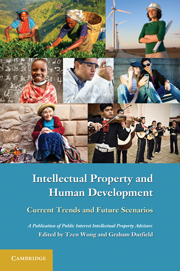Book contents
- Frontmatter
- Contents
- Boxes
- Contributors
- Foreword
- Preface
- Acknowledgements
- Acronyms and abbreviations
- Overview
- 1 Intellectual property through the lens of human development
- 2 Intellectual property and medicine: Towards global health equity
- 3 Food security and intellectual property rights: Finding the linkages
- 4 Trends and scenarios in the legal protection of traditional knowledge
- 5 Traditional cultural expressions: Preservation and innovation
- 6 Copyright and capability for education: An approach ‘from below’
- 7 Knowledge and education: Pro-access implications of new technologies
- 8 Cultural diversity and the arts: Contemporary challenges for copyright law
- 9 Scenario planning on the future of intellectual property: Literature review and implications for human development
- Appendix A Capability, opulence and utility1
- Appendix B Exploring alternative, collaborative models of innovation for medicines and vaccines1
- Appendix C Strategies and laws to promote traditional medicinal knowledge1
- Appendix D Educational use exceptions to copyright: A comparison among selected jurisdictions1
- Appendix E Copyright and contemporary art: A case study
- Index
Appendix C - Strategies and laws to promote traditional medicinal knowledge1
Published online by Cambridge University Press: 05 June 2012
- Frontmatter
- Contents
- Boxes
- Contributors
- Foreword
- Preface
- Acknowledgements
- Acronyms and abbreviations
- Overview
- 1 Intellectual property through the lens of human development
- 2 Intellectual property and medicine: Towards global health equity
- 3 Food security and intellectual property rights: Finding the linkages
- 4 Trends and scenarios in the legal protection of traditional knowledge
- 5 Traditional cultural expressions: Preservation and innovation
- 6 Copyright and capability for education: An approach ‘from below’
- 7 Knowledge and education: Pro-access implications of new technologies
- 8 Cultural diversity and the arts: Contemporary challenges for copyright law
- 9 Scenario planning on the future of intellectual property: Literature review and implications for human development
- Appendix A Capability, opulence and utility1
- Appendix B Exploring alternative, collaborative models of innovation for medicines and vaccines1
- Appendix C Strategies and laws to promote traditional medicinal knowledge1
- Appendix D Educational use exceptions to copyright: A comparison among selected jurisdictions1
- Appendix E Copyright and contemporary art: A case study
- Index
Summary
The value of traditional medicinal knowledge (TMK) in meeting the primary health needs of populations around the world is well documented. Recognizing the widespread use of traditional medicine in various regions including Asia, Latin America and Africa (e.g. up to 80% of the population in Africa depends on traditional medicine for its health care needs), the World Health Organization (WHO) has pursued strategies and activities ‘to facilitate integration of traditional medicine into the national health care system[s] by assisting Member States to develop their own national policies on traditional medicine’. A 2003 resolution at the World Health Assembly urges WHO member states to:
…take measures to protect, preserve and to improve if necessary traditional medical knowledge and medicinal plant resources for sustainable development of traditional medicine, depending on the circumstances in each country; such measures may include, where appropriate, the intellectual property rights of traditional practitioners over traditional medicine formulas and texts, as provided for under national legislation consistent with international obligations, and the engagement of WIPO in development of national sui generis protection systems.
A national sui generis law which deals specifically with the protection of traditional medicinal knowledge is the Act on Protection and Promotion of Traditional Thai Medicinal Intelligence (1999 [BE 2542]) [hereinafter ‘Thai Act’]. The Act distinguishes among different categories of ‘traditional formulations’: ‘national formulae’ are formulations which are crucial for human health and are held by the State; ‘private formulae’ can be freely used by the owner (third parties must obtain permission from the owner to use the formula); ‘general formulae’ may be used freely by anybody and comprise traditional formulae that have been widely used or whose intellectual property protection have expired (see Kuanpoth 2001). The Act stipulates that the Minister of Public Health has authority to decree a certain formula of traditional Thai medicine as a ‘national formula’ (section 17). To be eligible, the traditional formula must be of significant benefit or have special medical or public health value (section 17). After the announcement, the rights of such a formula belong to the State. The use of a national formula for R&D of drugs for commercial benefit is subject to permission from the authorities and the payment of fees (see section 19); criminal sanctions are provided for in the case of infringement (section 78; Kwanpoth 2001, pp. 6–7).
- Type
- Chapter
- Information
- Intellectual Property and Human DevelopmentCurrent Trends and Future Scenarios, pp. 376 - 378Publisher: Cambridge University PressPrint publication year: 2010



